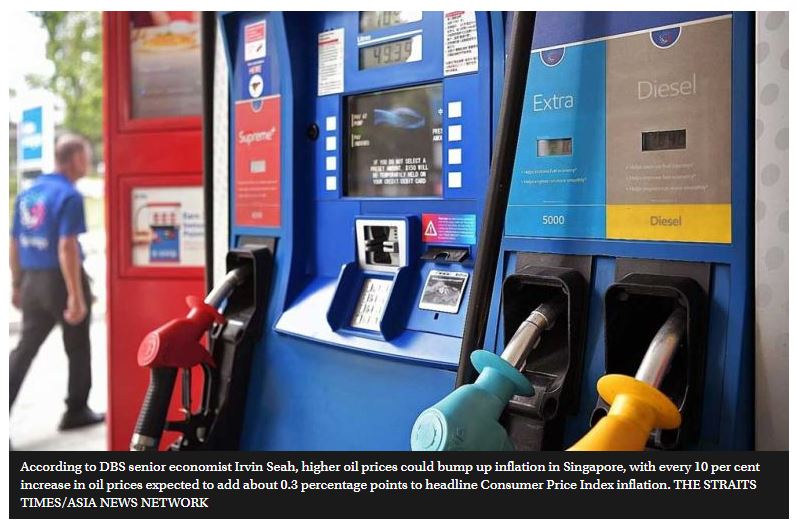Analysts say Singapore could see elevated inflation if increase in oil price persists
Asia’s oil-reliant economies could take a hit if crude prices remain higher, with Singapore facing potential fallout in the form of inflation, analysts said on Monday.
They were responding to the surge in oil prices after drone strikes on Saudi Arabian production facilities last weekend, which took out about five per cent of the global supply. The processing plant at Abqaiq, where one of the attacks took place, handles crude from Ghawar, the world’s largest conventional oil field.
Although the aim was to restore about a third of the disrupted production by early this week, it could take months to return to full capacity. Reports said Saudi Arabia is tapping into its crude oil stockpile, which can cover the temporary outage by up to 40 days.
Meanwhile, US President Donald Trump has authorised the release of emergency inventory from the US strategic reserves.
“If higher oil prices are here to stay, Asia’s oil-reliant economies such as China, Japan, India, South Korea and the Philippines will start to feel the pain as higher energy and raw material prices add on to the cost burden,” said CMC market analyst Margaret Yang.
China, India, Japan and South Korea are among the world’s top buyers of oil.
Citi Research expects oil prices to be kept higher as well, citing anxiety over the vulnerability of Saudi Arabia’s oil supply, which makes up about 10 per cent of global production. Other factors include a re-escalation of US-Iran tensions and fears of mounting geopolitical risk in the Gulf.
The US said earlier that Iran was behind the damaging drone attacks on the Saudi facilities, prompting Teheran to accuse Washington of “deceit”.
For Singapore, higher oil prices could be a double-edged sword, said DBS senior economist Irvin Seah.
With the US and Saudi Arabia tapping their stockpiles to ease any supply disruption, he believes the near-term impact will be marginal. If the situation remains dire for a prolonged period, pushing prices up, the impact on Singapore’s economy will heighten, he added.
While some areas such as transport and utilities may see a rise in cost, others like the oil refinery industry could reap benefits.
For consumers, higher oil prices could bump up inflation in Singapore, with every 10 per cent increase in oil prices expected to add about 0.3 percentage points to headline Consumer Price Index inflation, said Seah.
Maybank Kim Eng economist Chua Hak Bin added that airlines may see their operating costs go up as well, given that oil prices are connected to fuel cost, which may affect the cost of running flights.
But Seah noted that there were mitigating factors, as the impact could be partially offset by lower electricity tariffs as a result of the Open Electricity Market scheme rolled out from November last year.
“Moreover, an outsized accumulated Budget surplus of about $15 billion implies that the government is in a strong fiscal position to introduce offset measures to curb against the price impact on consumers, if required,” he said.
On the other hand, Singapore’s oil and gas sector, which accounts for about five to six per cent of its gross domestic product, could benefit from a rise in prices, he said.
Stockpiles from before the hike could still be used, with exports subsequently priced at higher levels.
But Chua believes the oil price shock may not have a significant impact on global inflation.
He said inflation would unlikely rise to “alarming levels”. Even as the hike in oil prices comes at a time when global growth is “a bit precarious”, global inflation is low.
He added that the Organisation of the Petroleum Exporting Countries, which include Saudi Arabia and Iran, does not have as much of a stranglehold on supply compared with 40 years ago. Saudi Arabia accounts for close to 10 per cent of Singapore’s total oil imports.
IG market strategist Pan Jingyi said that the trickle-down effect of higher prices remains uncertain for now, adding that it was hard to estimate by how much the prices would rise or how long the impact would linger.
She added that the market was not faring “too badly”. While Brent crude prices were initially up 13 per cent, the increase eased to around 10 per cent in the later part of Monday.
THE STRAITS TIMES (SINGAPORE)


 Thailand
Thailand




